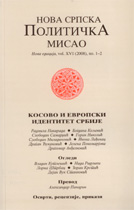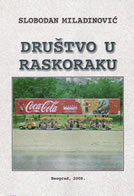| NSPM in English | |||
A Decade Since the Air Strikes, 5 years Since the Anti-Serb Riots |
 |
 |
 |
| четвртак, 26. март 2009. | |
|
The Kosovo crisis during which local conflicts in the post-Yugoslavian space culminated in the NATO attack against the sovereign Yugoslavia left the world facing a new reality, with the system of international relations established by the Yalta and Potsdam Conferences defunct, Europe geopolitically subdued by the US, and the US entrenched at the Balkans. Albanian criminal clans increasingly strengthened their positions in Kosovo ever since, and even the terrorist Kosovo Liberation Army staged a comeback under the guise of the new Kosovo security forces. Currently Albanians in Kosovo are striving to gain control over the Serb enclaves in the northern part of the province and making serious efforts to broaden Albanian extremist movements in the southern regions of Serbia (Presevo, Bujanovac, Medveda). During her recent meeting with the Pristina leadership, US Secretary of State H. Clinton confirmed the continuity of Washington's Balkan politics, especially that with respect to Kosovo. She gave her Albanian partners a clear indication that the US would not leave the Balkan job unfinished. Thus encouraged by the US, Kosovo “Prime Minister” H. Thaci declared the regulations set by the UN Mission in Kosovo as well as the UN Security Council Resolution 1244 overruled and the entire bulk of their documents - inapplicable in Kosovo. At the same time, one gets an impression that the European Rule of Law Mission in Kosovo (EULEX) coexists with the Kosovo Albanians in perfect harmony as Thaci says his administration will in every possible way support the EULEX activity across the province and in its northern - Serb-populated - part in particular. In other words, the UN administration is being sidelined by simply discarding the UN Mission in Kosovo and arbitrarily transferring its functions to EULEX. The personnel of the UN Mission will be reduced to purely symbolic numbers. Great Britain says it plans to withdraw 167 military servicemen from Kosovo. The Spanish contingent in the UN Mission (620 servicemen) is also packing bags. In a strange concert with Thaci, Serbian President B. Tadic has lightheartedly recognized EULEX. The latter and the government of Serbia reached an agreement that the EULEX laws should be enforced in the northern part of Kosovo. As a result ELEX can assume the responsibility for law and order, of course interpreting them as it sees fit. President V. Kostunica charged EULEX with releasing Albanians whose guilt for crimes against Serbs had been proven in court and said the policy amounts to complicity in the carefully planned expulsion of Serbs from Kosovo. The commemoration of the victims of the anti-Serb riots which took place in Kosovo and Metohija 5 years ago highlighted the total helplessness of the current Serbian administration. The death toll during the March 17-18, 2004 riots reached 19, with 954 people wounded. Serbs were ethnic-cleansed from 6 cities and 9 villages, and 935 residences and 35 churches and monasteries were destroyed during the tragic events. The commemorations were led by the Serbian Orthodox Church. Memorial services were held in all churches and monasteries of Kosovo and Metohija and in the Belgrade cathedral. Amfilohije, the Metropolitan of Montenegro and the Littoral, said that the impunity of those who committed the crimes breeds new waves of lawlessness. On the eve of the 10th anniversary of NATO bomb strikes on Yugoslavia the position of “the international community” on the Serbian issue was expressed clearly by NATO Secretary General Jacob de Hoop Scheffer who said that the intervention had been necessary. No doubt, the West needed the intervention. J. Norris, an aide to Strobe Talbott who held the position of M. Albright’s deputy during the crisis, published memoirs where he explained that Milosevic was the only figure capable of opposing the transformation of Central and East Europe. According to Norris, Milosevic's stubbornness made the point of NATO's further existence questionable and this fact rather than the “plight” of Albanians in Kosovo was the actual reason behind the intervention. The resistance from the Serbian leader had to be broken at any cost. Albanians and the US had common interests in Kosovo. The former sought independence for the province and the latter wanted to deploy NATO forces in it. The unyielding Milosevic was portrayed as the “ultimate evil” by the global media. When Yugoslavia rejected the Rambouillet ultimatum, NATO resorted to force. By doing so, as Norris cynically remarks, it also undermined the authority of the UN which was the last trump card at Russia's disposal. The Racak incident – a provocation presented as an act of genocide against Albanians – was invoked as the pretext for the aggression. Russia's indecisiveness in 1999 equally hurt the interests of Serbs and those of its own. In essence, Russia allowed to set a precedent for a military intervention against a sovereign country, though – Norris shows his full awareness of the fact – few in Russia believed that so intense an intervention launched by NATO in a relatively insignificant place like Kosovo was not a part of a much broader, global plan. The country targeted by the global plan was Russia. Not surprisingly, a team of Russian diplomats submitted a document to the US and Finnish negotiating team with a claim that NATO was attempting to eliminate Russia as a global factor. Norris is open about the matter in his book – if NATO can bomb Kosovo, the alliance is clearly ready to intervene in Russia without any UN mandate. On the second day of the NATO campaign against Yugoslavia Russian Foreign Minister I. Ivanov told M. Albright during a phone conversation that while the Yugoslavian forces had killed 300 people in Kosovo over the past year, the death toll after just one night of NATO bomb strikes reached 50. Ivanov described the air strikes as undisguised genocide. In a gross breach of the norms of the international law, NATO forces launched over 35,000 air raids during the 78 days of the attack against Yugoslavia, hitting 995 targets. Several thousand civilians were killed (the exact number is unknown). Militsa Rakic, a 3-year-old girl killed by a NATO strike, is the epitome of the Serbian tragedy caused by the NATO aggression. The numbers of the Serbian exodus from Kosovo passed the 1.5 mln mark. A total of 25,000 tons of explosives (79,000 tons according to other sources) were dropped on Yugoslavia. NATO used cassette bombs - over 2,000 of them were dropped spreading some 300,000 small mines, 20,000-30,000 of which are estimated to remain unexploded, awaiting new victims. The use of shells with low-grade Uranium during the offensive and the destruction of petrochemical industry installations caused an environmental disaster in the region. The infrastructure of the former Yugoslavia – airports, bridges, railroads – also suffered serious damage. At least half of the country's military-industrial complex was ruined as were numerous health care and education centers, architectural landmarks, etc. The damage totaled $200 bn, and this is only a part of the list of crimes NATO committed against Serbs. A decade after the aggression NATO continues to strengthen its positions in the Balkans while the official Belgrade makes no efforts to protect the Serbian population locked in ghettos in Kosovo. http://en.fondsk.ru/article.php?id=2008 |
Остали чланци у рубрици
- Playing With Fire in Ukraine
- Kosovo as a res extra commercium and the alchemy of colonization
- The Balkans XX years after NATO aggression: the case of the Republic of Srpska – past, present and future
- Из архиве - Remarks Before the Foreign Affairs Committee of the European Parliament
- Dysfunction in the Balkans - Can the Post-Yugoslav Settlement Survive?
- Serbia’s latest would-be savior is a modernizer, a strongman - or both
- Why the Ukraine Crisis Is the West’s Fault
- The Ghosts of World War I Circle over Ukraine
- Nato's action plan in Ukraine is right out of Dr Strangelove
- Why Yanukovych Said No to Europe

.jpg)








 For Serbs, the March of 2009 is marked by two gloomy anniversaries – a decade since the NATO aggression against Yugoslavia and 5 years since the anti-Serb riots in the Province of Kosovo and Metohija.
For Serbs, the March of 2009 is marked by two gloomy anniversaries – a decade since the NATO aggression against Yugoslavia and 5 years since the anti-Serb riots in the Province of Kosovo and Metohija.












